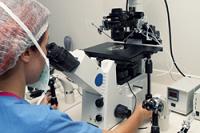Advertisment
ASCO 2016: Elderly glioblastoma patients achieve longer survival with radiation plus temozolomide

by Bruce Sylvester: Researchers from a randomized phase III trial report that addition of temozolomide (Temodar) chemotherapy during short-course radiation therapy, followed by monthly maintenance doses of temozolomide, significantly improves survival among elderly patients with glioblastoma, reducing risk of death by 33%.
The findings were presented in June of 2016 the plenary session of the annual meeting of ASCO/American Society of Clinical Oncology. This is the first study to evaluate the combination of temozolomide and radiation therapy in older adults, who account for half of patients with glioblastoma.
“Although glioblastoma disproportionately affects older patients, there are no clear guidelines for treating these patients, and practice varies globally,” said study co-author James R. Perry, MD, FRCPC, The Crolla Family Endowed Chair in Brain Tumour Research at the Odette Cancer and Sunnybrook Health Sciences Centres in Toronto, Canada. “This study provides the first evidence from a randomized clinical trial that chemotherapy in combination with a shorter radiation schedule significantly extends survival without a detriment to quality of life.”
Investigators enrolled 562 subjects 65 years and older who were newly diagnosed with glioblastoma. Median age was 73 years, and two-thirds were older than 70 years.
The patients were randomized to short-course radiation therapy (40Gy in 15 fractions over 3 weeks) with concurrent and adjuvant temozolomide, or to radiation monotherapy.
Combination therapy extended median overall survival, from 7.6 months with radiation monotherapy to 9.3 months with combination therapy.
Tumor growth was slowed in the temozolomide group, with median progression-free survival of 5.3 months vs. 3.9 months in the radiation monotherapy group.
“Although the difference in median survival seems modest, temozolomide significantly increased the chances of surviving two or three years. For an individual patient, that can mean being able to be part of another family holiday or celebration,” said Perry.
The 1-year and 2-year survival rates were respectively 37.8% and 10.4% with radiation plus temozolomide versus 22.2% and 2.8% with radiation monotherapy.
Benefit from temozolomide was greater among subjects with MGMT promoter methylation, a genetic abnormality linked to better response to chemotherapy and longer survival in glioblastoma. Among these 165 subjects, median overall survival was 13.5 months with temozolomide treatment and 7.7 months with radiation monotherapy.
Patients who received temozolomide achieved a 47% lower risk of death than those who received radiation monotherapy.
Quality-of-life analyses revealed no differences in physical, cognitive, emotional, and social functioning between the two groups.





